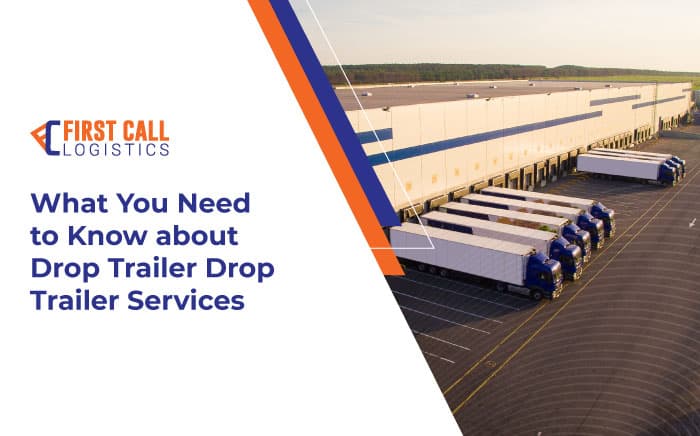What You Need to Know About Drop Trailer Services

Supply chain management is all about efficiency. Each year more retail customers are growing to expect faster shipping times as the norm, and more businesses expect optimal product delivery without delays or excuses. Efficient transport requires smart logistical solutions, which is where drop-trailer programs make their mark.
Drop trailer programs allow drivers to leave trailers at a shipper’s facility for unloading or loading at the receiver’s convenience and to pick up previously loaded trailers at an appointed time. For shippers, employing drop trailer programs allows greater flexibility (since trailers can be loaded at any time), lowers costs, and streamlines the supply chain. It improves the shipping process for carriers too, as drivers will no longer have to spend time waiting for freight to be loaded and unloaded.
How Drop Trailer Programs Help Shippers, Carriers, and Customers
Drop trailer shipping accelerates the shipping and transportation process while easing the burden placed on drivers. Per the FMCSA, drivers can’t be on the road for more than 11 hours a day. By dropping the trailer in a location to be dealt with later by the shipper, drivers won’t have to risk missing an appointed drop-off appointment or getting caught skipping their mandatory breaks. When operating smoothly, a trailer can be dropped and picked up by another driver almost immediately for a continual shipping process that gives customers faster and more accurate shipping times.
The convenience and flexibility afforded to drivers also extend to warehouse workers, who can now load and unload trailers without worrying about being understaffed or working overtime. Eliminating downtime in this stage of the supply chain creates a noticeable ripple effect for the customer—namely, reducing shipping costs even for items ordered on a tight timeline.
The practice of drop trailer shipping also adds capacity to a customer’s supply chain. Trailers can act as bonus storage space for companies and give businesses the ability to scale up their ability to move freight without the additional cost normally associated with expanding storage.
Is a Drop Trailer Program for You? Factors to Consider
Drop trailer services can be a smart way to save your business time and money, but there are additional factors to consider before seeking out a provider. While drop trailers boast many positive advantages—including cost-saving benefits like avoiding all detention and late delivery fees—some circumstances might mean a drop trailer program isn’t right for you.
Shipments of produce and other perishable goods aren’t suited for drop trailers, since keeping the goods fresh, climate-controlled, and on a tight delivery schedule is necessary for successful delivery. Produce isn’t made to sit in trailers for extended periods without any oversight, nor is any other shipment of goods that could be considered time-sensitive. Drop trailers will often be loaded and unloaded quickly, but the time goods spend stored in trailers is variable—the flexibility afforded by these programs comes with the downside of no precise way to predict the goods’ schedule.
Terms to Know When Exploring Drop Trailer Programs
Drop Trailers: The physical truck trailer that is “dropped” at a location without a set appointment window, to be loaded and unloaded at the convenience of the warehouse. This method of shipping also eliminates carriers’ need to wait with the shipment while the goods are managed.
Trailer Pools (or Drop Pools): This term simply refers to a group of drop trailers left at one facility.
Drop-and-Hook: This is industry-speak for when a driver makes a dropoff and a pickup at the same facility. The driver comes in with an empty trailer and drops that trailer at the facility. Then, they hook to a trailer that was previously dropped and loaded and leave with that trailer. Drop-and-hook is a frequent practice among drop trailer shipping programs to maximize efficiency throughout the transportation process.
Trailer Leasing: When businesses look to expand their shipping capabilities by growing their fleet of trailers, leasing trailers is often the most cost-effective option. Leased trailers reduce risks to the business, limit debt, and drive down maintenance and overhead costs.
Opting into a drop trailer program can streamline your existing supply chain and aid customers, carriers, and shippers in the process. Our team at First Call Logistics would love to help you with all your shipping needs—reach out for a quote today!
Simplify your Next Shipment with First Call Logistics
Building and managing cost-efficient supply chains is a full-time job. First Call’s rare combination of in-house assets, expert problem-solving and track record of stellar customer service makes us the 3PL of choice for business partners with a wide range of shipping needs.